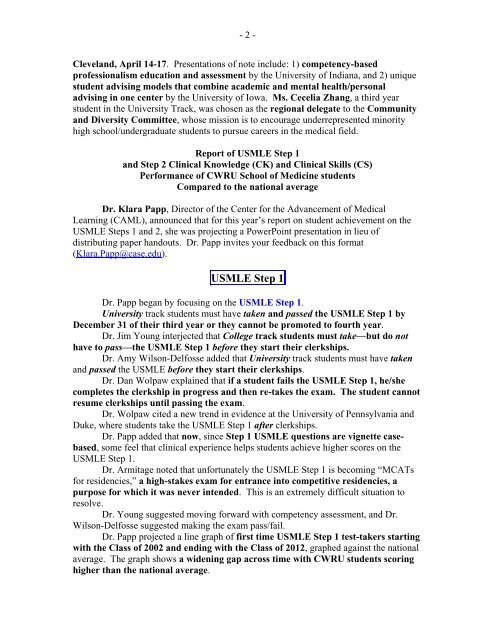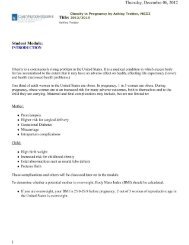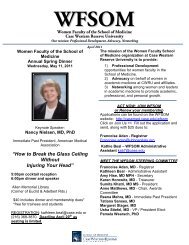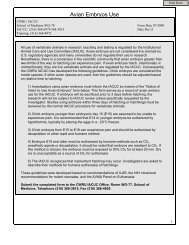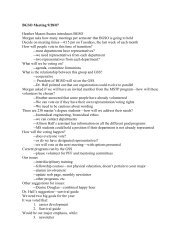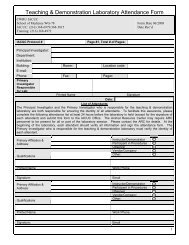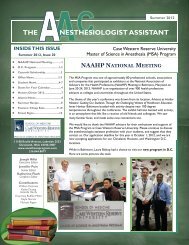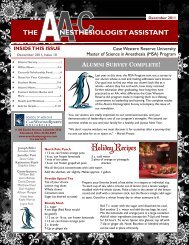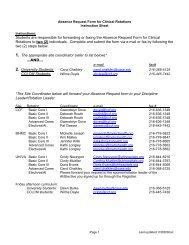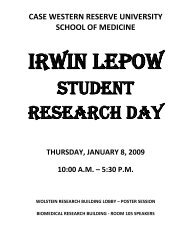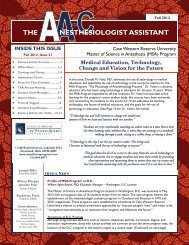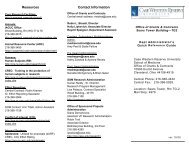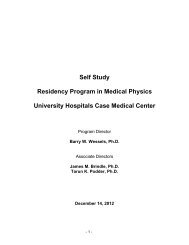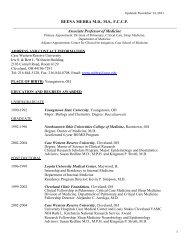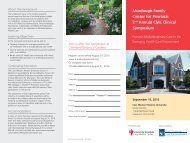4-28-2011 - Case Western Reserve University School of Medicine
4-28-2011 - Case Western Reserve University School of Medicine
4-28-2011 - Case Western Reserve University School of Medicine
Create successful ePaper yourself
Turn your PDF publications into a flip-book with our unique Google optimized e-Paper software.
- 2 -<br />
Cleveland, April 14-17. Presentations <strong>of</strong> note include: 1) competency-based<br />
pr<strong>of</strong>essionalism education and assessment by the <strong>University</strong> <strong>of</strong> Indiana, and 2) unique<br />
student advising models that combine academic and mental health/personal<br />
advising in one center by the <strong>University</strong> <strong>of</strong> Iowa. Ms. Cecelia Zhang, a third year<br />
student in the <strong>University</strong> Track, was chosen as the regional delegate to the Community<br />
and Diversity Committee, whose mission is to encourage underrepresented minority<br />
high school/undergraduate students to pursue careers in the medical field.<br />
Report <strong>of</strong> USMLE Step 1<br />
and Step 2 Clinical Knowledge (CK) and Clinical Skills (CS)<br />
Performance <strong>of</strong> CWRU <strong>School</strong> <strong>of</strong> <strong>Medicine</strong> students<br />
Compared to the national average<br />
Dr. Klara Papp, Director <strong>of</strong> the Center for the Advancement <strong>of</strong> Medical<br />
Learning (CAML), announced that for this year’s report on student achievement on the<br />
USMLE Steps 1 and 2, she was projecting a PowerPoint presentation in lieu <strong>of</strong><br />
distributing paper handouts. Dr. Papp invites your feedback on this format<br />
(Klara.Papp@case.edu).<br />
USMLE Step 1<br />
Dr. Papp began by focusing on the USMLE Step 1.<br />
<strong>University</strong> track students must have taken and passed the USMLE Step 1 by<br />
December 31 <strong>of</strong> their third year or they cannot be promoted to fourth year.<br />
Dr. Jim Young interjected that College track students must take—but do not<br />
have to pass—the USMLE Step 1 before they start their clerkships.<br />
Dr. Amy Wilson-Delfosse added that <strong>University</strong> track students must have taken<br />
and passed the USMLE before they start their clerkships.<br />
Dr. Dan Wolpaw explained that if a student fails the USMLE Step 1, he/she<br />
completes the clerkship in progress and then re-takes the exam. The student cannot<br />
resume clerkships until passing the exam.<br />
Dr. Wolpaw cited a new trend in evidence at the <strong>University</strong> <strong>of</strong> Pennsylvania and<br />
Duke, where students take the USMLE Step 1 after clerkships.<br />
Dr. Papp added that now, since Step 1 USMLE questions are vignette casebased,<br />
some feel that clinical experience helps students achieve higher scores on the<br />
USMLE Step 1.<br />
Dr. Armitage noted that unfortunately the USMLE Step 1 is becoming “MCATs<br />
for residencies,” a high-stakes exam for entrance into competitive residencies, a<br />
purpose for which it was never intended. This is an extremely difficult situation to<br />
resolve.<br />
Dr. Young suggested moving forward with competency assessment, and Dr.<br />
Wilson-Delfosse suggested making the exam pass/fail.<br />
Dr. Papp projected a line graph <strong>of</strong> first time USMLE Step 1 test-takers starting<br />
with the Class <strong>of</strong> 2002 and ending with the Class <strong>of</strong> 2012, graphed against the national<br />
average. The graph shows a widening gap across time with CWRU students scoring<br />
higher than the national average.


